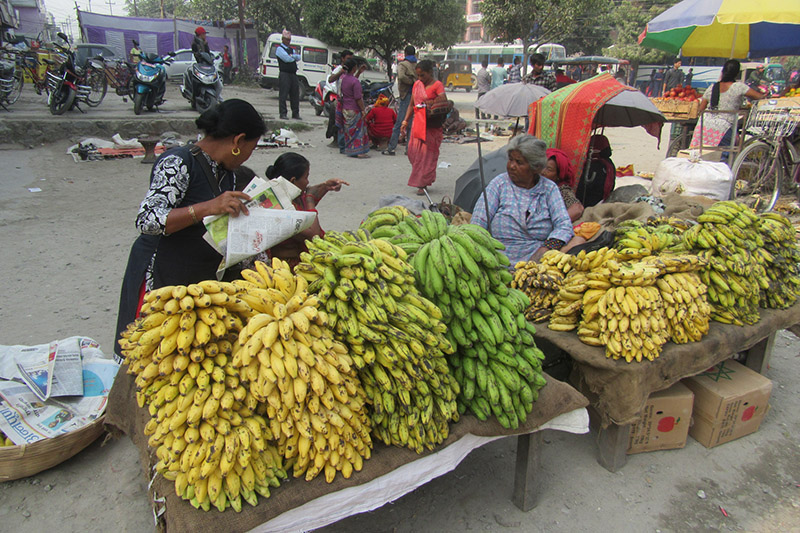Yellow light likely for banana import to ensure market for domestic produce
- Government may raise agriculture tax on imported bananas
- Subsidies, promotional packages sought for farmers
Kathmandu, November 19
The government is preparing to raise agricultural tax on imported bananas to slow down its import and ensure a market for domestic produce.
Chakra Pani Khanal, minister of agriculture and livestock development, told mediapersons that consultation with the Ministry of Finance was on to increase such tax on imported bananas to make domestic produce competitive and promote banana farming in the country.
The government levies 10 per cent agriculture tax on bananas. Under pressure from farmers, the government had raised tax on bananas by five percentage points to 10 per cent this fiscal.
However, farmers today submitted a seven-point memorandum to Minister Khanal urging the government to ensure market for domestically produced bananas, as farmers were finding it hard to compete with comparatively cheaper imported Indian bananas.
“We too feel the need to raise agriculture tax on imported bananas. Necessary discussions are being held with the finance minister on this front,” said Khanal.
Khanal added that the government would also promote banana farming in the country by introducing friendly policies and help farmers reduce the production cost of the fruit.
Uddhav Adhikari, president of the National Farmers Group Federation, said the government’s priority to promote banana farming and review agriculture tax on imported bananas were necessary as the import of Indian bananas, which are cheaper due to its low production cost and subsidies from the Indian government, had been affecting the market of Nepali bananas.
“Along with revisiting the agriculture tax on bananas, the government should announce subsidies and promotional packages for Nepali bananas to encourage banana farming,” said Adhikari.
The memorandum submitted by the farmers to the government also outlines the need to formulate effective policies to regulate the fruit market, establish banana zones in pocket areas where banana farming is done and ensure subsidised loan facilities for fruit farmers.
Meanwhile, Yubak Dhoj GC, secretary at the Ministry of Agriculture and Livestock Development, said priority should be given to boost the production of bananas in the country before discouraging the import of bananas. “Considering these issues, the government will take necessary decisions,” he said.
As per government statistics, banana farming is carried out across 18,000 hectares of land in the country and more than 50,000 farmers are involved in it. Nepal produces around 700,000 tonnes of bananas every year while the country’s annual demand stands at around 1.5 million tonnes.






